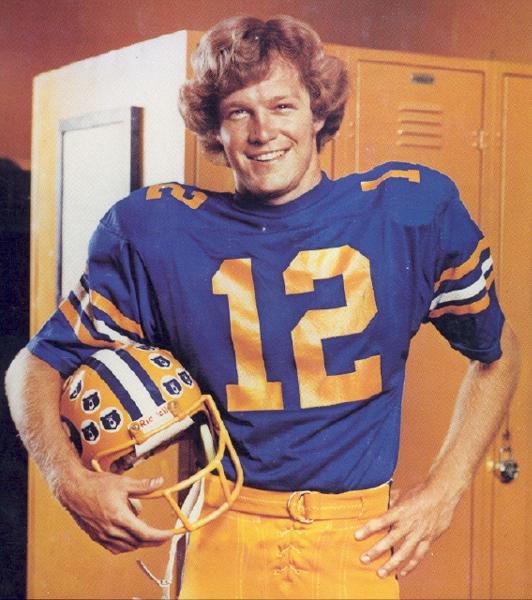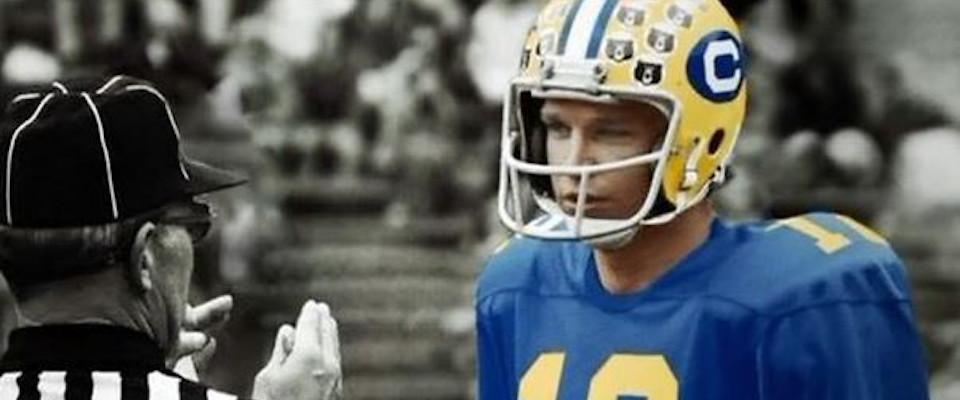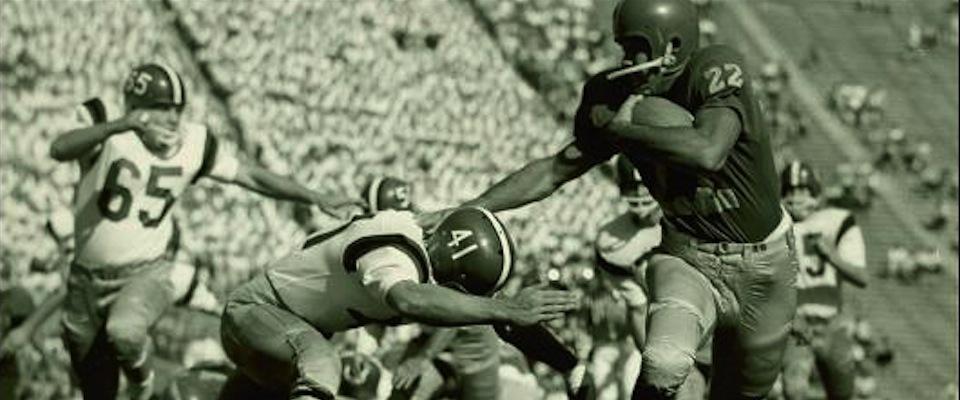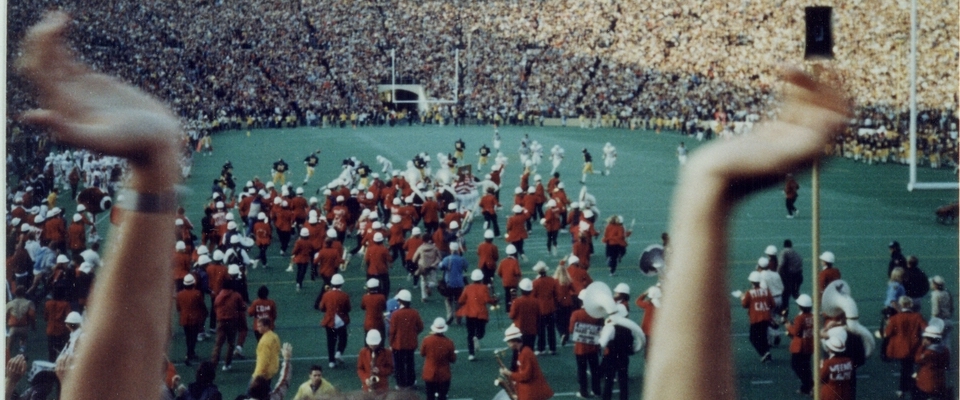In 1975, two years before Tom Brady was born, another Golden Boy burst upon the football scene. He was a Cal quarterback named Joe Roth, and he had it all: looks (6-foot-4, with wavy blond hair and, in the words of his girlfriend, Tracy Lagos McAllister, “a super-cute smile”), brains, and an abiding Catholic faith that led him to take the Golden Rule seriously.
“The sky was the limit for him,” recalls his head coach, Mike White. “He definitely would have been the first quarterback taken in the NFL draft. He had all the skills, plus a great work ethic. But most important, he had the temperament. The only other quarterbacks I’ve ever seen with a temperament like that were Joe Montana and Tom Brady.”
The sportswriters agreed, dubbing him Joe Cool, a name they also bestowed on Montana 10 years later. But even more impressive was the way he conducted himself off the field.
“I was a lowly freshman when he was a senior,” says wide receiver Matt Bouza, who went on after Cal to play eight seasons with the Baltimore/Indianapolis Colts. “Most seniors wouldn’t even talk to freshmen, but on the first day of practice he came over to me, shook my hand, and said, ‘How are you doing, Matt? I’m Joe. Where are you from? What high school did you go to? Do you need anything?’ And it wasn’t just me; that’s the way he treated everybody.”

Joe Roth; photo credit JR12 Productions
Teri Wilkinson Carey, who played on Cal’s first women’s volleyball team after Title IX was implemented in the early 1970s, remembers, “We shared the weight room with the football team, and a lot of them were irked that were girls in the weight room. There was a lot of verbal harassment, and one guy pointedly moved the weight stacks from 300 down to 50, at a time when we were capable of pressing 250 to 300. Joe was quietly doing his thing in one corner of the room, but when he saw how the guys were hassling us he said, ‘Hey guys, cut it out. They wear blue and gold just like us.’ I won’t say they were ever nice to us, but they quit hassling us because of him.”
“He never complained, never made excuses, never took a day off, no matter how bad he felt.”
But what only Coach White and Joe Roth’s closest friends knew was that he was hiding a terrible secret: He was dying from melanoma, an especially vicious cancer of the skin. And the memory of his stoicism and courage in fighting that lonely battle still moves them to tears, 40 years later.
“He didn’t want anyone feeling sorry for him,” says McAllister. “He told me about the melanoma when we started dating, but he played it down, saying ‘I’m fine.’ And he told everyone else it was nothing. He totally lied about it. His main concern was making it easier for everyone around him.”
“He never complained, never made excuses, never took a day off, no matter how bad he felt.” White adds. “I learned more about life from him than any other player I’ve been around. After he passed away, his teammates wore a patch on their uniforms with his number—No. 12—and the words ‘Faith, Humility, Courage.’ That was Joe.”
It’s the stuff of a Hollywood movie; but, curiously, none has ever been made—until now. This week, the Pac 12 Networks is scheduled to broadcast the documentary Don’t Quit: The Joe Roth Story for Bay Area viewers at 7:30 p.m. on Tuesday, 9 a.m on Saturday Oct. 31 (the date of this year’s annual Joe Roth Memorial Game), and 7:30 p.m. on Sunday, Nov. 1. (Listings for other areas are here.)
It’s a labor of love for the two filmmakers, Phil Schaaf and Bob Rider, who were just boys when Roth died; they went on to attend UC Berkeley themselves in the 1980s. It has already won the Outstanding Achievement In Documentary Filmmaking award at the Newport Beach Film Festival, and the Best Biography award at the Sacramento Film Festival.
“It should be mandatory viewing for all Cal students, not just the football team.”
The genesis of the project can be traced to the 30th anniversary of Roth’s passing, when Rider was pleased to read that a film would be made about the legendary quarterback. “About time,” he thought. But the years passed and nothing came of it.
“It made me wonder: Did he have some kind of flaws that they didn’t want people to know about?” he recalls. “So I did a little research and found a couple of articles in the L.A. Times at the time of his death, and it talked about the influence he had, not just on the team, but on the whole school.” The deeper he dug, the more impressed he became. “I didn’t know Joe died of melanoma. I thought it was something else, like leukemia or something. My sister died of melanoma in 2003. She had long blonde hair and blue eyes, and she was a really great person, too, so there were a lot of parallels although she wasn’t a college athlete.”
He met with Schaaf, whom he knew from his days at Cal, and the idea for a documentary took hold. “We have all the people who can tell the real story—his family, the people who grew up with him, the people who played with him.’ We wanted it to be authentic.”
“They did a wonderful job,” says McAllister, Roth’s former girlfriend. “They really captured the essence of the time. It’s such a perfect evocation of Joe, including all the music that he loved. It came out great, and I was really proud to be in it.”
Bouza adds, “It should be mandatory viewing for all Cal students, not just the football team.”
“The people we interviewed made it easy for us,” says Schaaf. “We’d leave messages on their voicemail, and they’d call us back in 90 seconds! In many cases, people had to put the phone down while they cried. That’s the kind of impact Joe had. He struck very deep nerves.”
“And it wasn’t just the guys he played with; it was also the people he played against,” adds Rider. “Gary Jeter, who played defensive end for USC, said, ‘I’ve been waiting 30 years for this phone call.'”
Before starting the project, they went to Roth’s family to get their blessing.
“His sister-in-law Kim, whom he was very close to, asked us, ‘How are you going to tell the story?'” Rider recalls. “I said, ‘You guys are going to be the ones to tell the story. We’ll just turn on the camera and ask some questions.'”
It was Roth’s lifelong dream to play in the National Football League, but he also had another one: to go to Cal and get his degree in physical education.

“He really enjoyed school and worked hard at his studies,” says McAllister. “I didn’t have any money and neither did he, so we didn’t go out to dinner or movies a lot. Sometimes we’d go downstairs at Larry Blakes’s or to Big Al’s, a dive bar on Durant where they gave free beer to the guys on the team. But most of our dates were study dates at the Boalt Hall law library. Getting that degree meant so much to him. He was still turning in papers a week before he died.”
After the 1976 season ended, Roth was picked for three all-star games: the East-West game in San Francisco, the Hula Bowl in Hawaii, and the Japan Bowl in Tokyo.
“His back hurt too much to play in the East-West game, but he was determined to honor his commitments,” says White, who was the coach for all three games. “He played pretty well in the Hawaii Bowl, and when we got to Japan the people fell in love with him, despite the language barrier. When the time was up at one autograph-signing session, he noticed that hundreds of kids were still waiting. So he kept signing until every one had an autograph. He just smiled and thanked them. Then he went outside and vomited in the bushes.”
One of the things Roth loved to do in that pre-text message era was sending McAllister whimsical post cards.
“He always signed them ‘Herman Schwartz’ so if somebody saw it in my mail slot they wouldn’t think it was from him,” she says. “I still have everything he ever wrote me.”
On February 14, 1977—Valentine’s Day—McAllister turned 21. Roth was in the hospital by then, so his teammates Fred Besana and Greg Collins took her to dinner in his stead. She still remembers their kindness.
That same day, another postcard from Herman Schwartz arrived. On one side was a Peanuts cartoon featuring Snoopy in his “Joe Cool” persona, with the caption “I lose my cool every time I think of you.” On the other side he wrote, “Sorry this is all I can do, but things are busy for me right now. I guess you are over the hill now and can throw away the fake I.D. After next week sometime maybe we can go out for tea or something because my stomach is not into heavy things. It seems like eating just doesn’t agree with it. Today it didn’t agree twice. Oh well. So after I rebound from next week’s treatment we’ll go out for something light, like tea or hot chocolate. Sounds exciting, huh? Well, take it easy now that you have the world on your big 21-year-old shoulders. Love, Joe.”
“I couldn’t believe he was thinking of me on my birthday when he was fighting for his life in that hospital,” she says. “Who would do that?”
“Sending that postcard was the last thing he ever did,” says Schaaf. “The next day, he was a cripple. He was on a morphine drip, and the doctors recommended removing his legs. That’s how swift the disease was upon him.”

Four days after McAllister’s birthday, Roth insisted on being discharged from the hospital so he could die at home. He passed away the next day. McAllister was attending church services at the Newman Center, right across the street from his apartment, when she heard the news.
“The priest started offering prayers, saying, ‘This is for Joe Roth, who died this afternoon.’ I almost fainted right there. I ran out of the church to his apartment. His roommate, John Matlock, was standing out in front. He grabbed me as I ran by him and said, ‘I was just going to call you.'”
It was February 19, 1977. Joe Roth was only 21. His funeral was held at the Newman Center, where he had attended Mass so many times. Carey attended with the members of the women’s volleyball team. “We just sat there,” she remembers, “and bawled our eyes out like babies.”
Cancer cheated Roth out of his dream to get his degree, but the university posthumously awarded him the Berkeley Citation, which is awarded to a wide range of distinguished people, academic or nonacademic, whose attainments significantly exceed the standards for advancement in their fields and whose contributions to the university are manifestly “above and beyond the call of duty.” He was also inducted into the University of California Athletic Hall of Fame, and his number 12 was retired—the only Cal player ever to be so honored.
Several awards are also named after him, including the Joe Roth Award for the high school player in the San Diego area who best demonstrates courage; the Joe Roth Memorial Award, which is given to the San Diego County junior college football player who best exemplifies high academic standards and athletic excellence; and the Joe Roth Award, which is given to the Cal football player who best demonstrates courage, attitude, and sportsmanship. In addition, Cal designates each year’s home game against either USC or UCLA as the Joe Roth Memorial Game.
The Japan Bowl named its Most Valuable Player award after him. And every year at his old high school, Granite High in San Diego, the coaches select the player, no matter what position he plays, who best exemplifies Roth’s class and humility, and give him number 12 to wear all season.
“He never thought of himself as The Great Joe Roth,” says McAllister. “He was just Joe.”





















